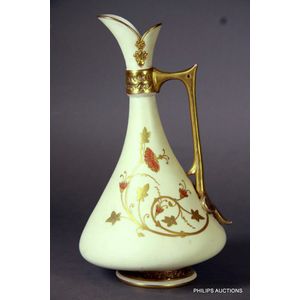Persian-style Ewer with Floral Tendrils and Gilded Band
You must be a subscriber, and be logged in to view price and dealer details.
Subscribe Now to view actual auction price for this item
When you subscribe, you have the option of setting the currency in which to display prices to $Au, $US, $NZ or Stg.
- Manner of .... / Style of ..... - A cataloguing term where the item, in the opinion of the cataloguer is a work in the style of the artist, craftsman or designer, possibly of a later period.
- Ewer / Pitcher - A type of jug with a narrow neck bulbous body and wide spout, originally used for carrying and storing liquids such as water or wine. In medieval times they were the source of water to wash ones hands during and after a meal. later the shape was used for vessels in silver, gold, glass and ceramics.
In Victorian times they were made in ceramics and occasionally glass with a matching basin, and sometimes other accessories such as a soap holder or toothbrush holder. Their purpose was to provide facilities for personal washing In the early 19th century were often enclosed in purpose built stands, and later resided on a washstand..
Sometimes the words "ewer" and "pitcher" are used interchangably, but a pitcher is generally considered to be a jug, and would have a wide mouth, and a gently tapering body. - Fleur-De-Lis - The fleur-de-lis is a stylized lily or iris flower with
three petals that has been used as a decorative motif for thousands of years. It
often appears in Christian iconography symbolising the Holy Trinity and as an
emblem that reflects the purity of the Virgin Mary. In decorative art and antiques
decoration, the fleur-de-lis is often used as a symbol of elegance, refinement,
and good taste.
The fleur-de-lis has a rich history and in ancient times, it
was associated with royalty, purity, and the divine, and it was used as a
symbol of the French monarchy for many centuries.
It is a common design element in ceramics, silverware, jewellery,
furniture, and other decorative objects, and it can be found in many different
styles and forms. - Gilding - Gilding is a method of ornamentation whereby a thin sheet of gold metal is applied to items made of wood, leather, ceramics, glass and silver for decorative purposes.
For furniture including mirrors, the sheet of gold is usually applied over a coating of gesso. Gesso is a mixture of plaster of Paris and gypsum mixed with water and then applied to the carved wooden frames of mirrors and picture frames as a base for applying the gold leaf. After numerous coats of gesso have been applied, allowed to dry and then sanded a coat of "bole", a usually red coloured mixture of clay and glue is brushed on and allowed to dry, after which the gold leaf is applied. Over time parts of the gilding will rub off so the base colour can be seen. In water gilding, this was generally a blue colour, while in oil gilding, the under layer was often yellow. In Victorian times, gilders frequently used red as a pigment beneath the gold leaf.
Metal was often gilded by a process known as fire gilding. Gold mixed with mercury was applied and heated, causing the mercury to evaporate, the long-term effect of which was to kill or disable the craftsman or woman from mercury poisoning. The pursuit of beauty has claimed many victims, not the least of which were the artists who made those pieces so highly sought after today.
This item has been included into following indexes:
-
Royal Worcester (England), item types
- jugs & ewers 344
- other 3,511
- vases, other 1,194
Visually similar items

Royal Worcester dual handled ewer. Floral decoration, with gilt highlights. Pierced shoulders and base. Stamped 1064 & JBK to base. C.1880's. Some small gilt losses. Height 46 cm

A Moorcroft Pottery 'Verley' vase, 1997, by Rachael Bishop. One of 4 designs in the 'New Forest' series depicting the new forest bluebells drenched in moonlight, with makers stamps to base. Height 30.8 cm

A Royal Worcester spill vase painted by Maude Miller, with blackberries and blossoms; shape G923, dated 1954. Height 15.5 cm

Pair of Royal Worcester tall cylindrical vases painted with sheep, signed Harry Davis
